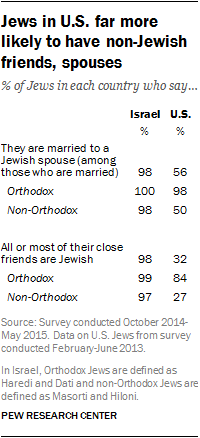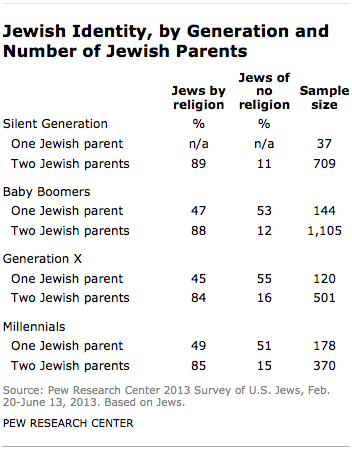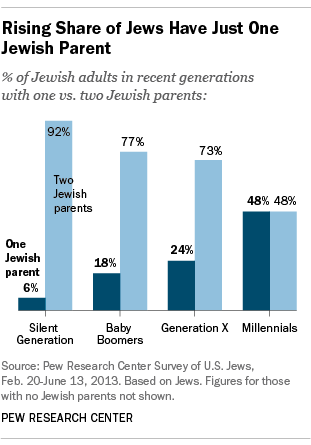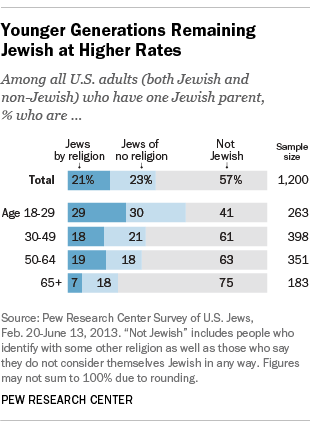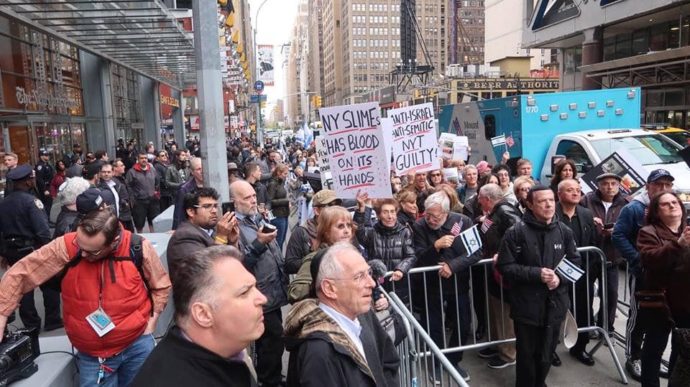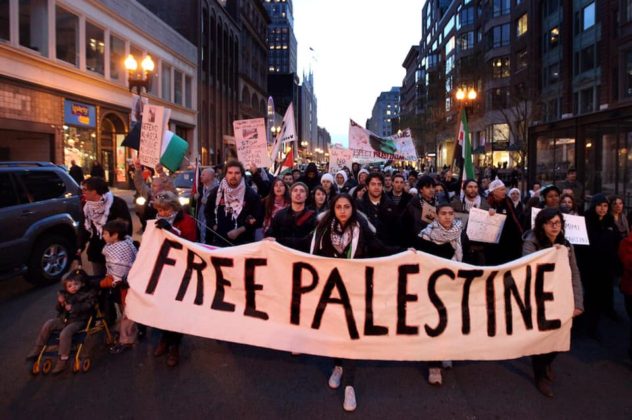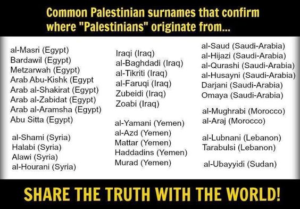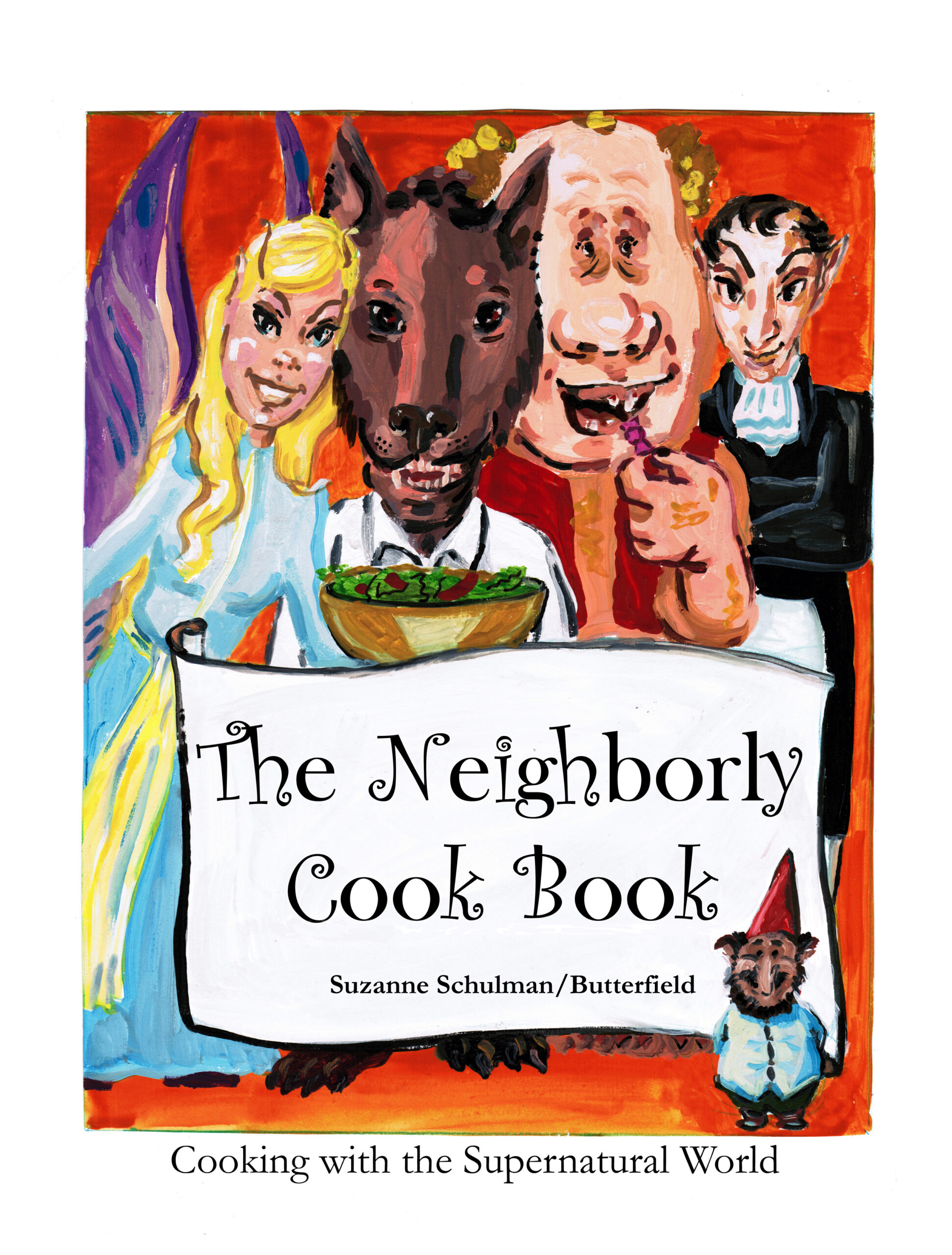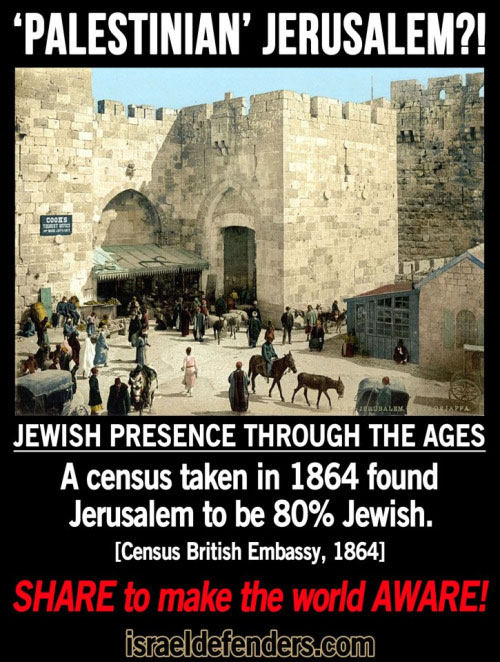Is there a future for non-Orthodox American Jewry?
|
||||||||||
Table 6 Family configurations for all non-Haredi American Jews ages 25-54
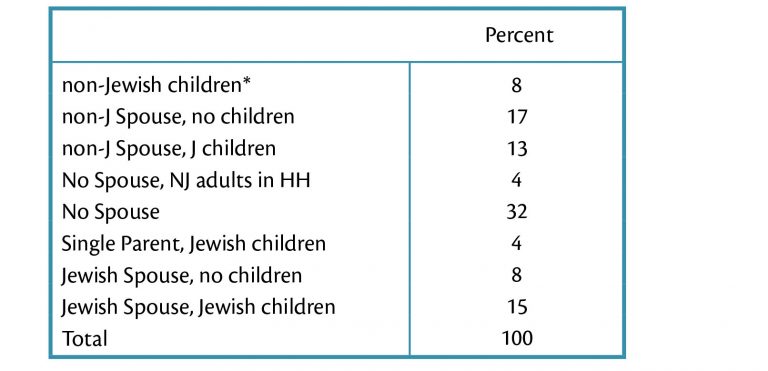 jppi.org.il Table 6 Family configurations for all non Haredi american Jews ages 25-54 http://jppi.org.il/new/en/article/english-raising-jewish-children-research-and-indications-for-intervention/english-family-engagement-and-jewish-continuity-among-american-jews/english-family-configurations/ *raising children as non-Jews |
||||||||||
*marriage within one’s own family, race, or other grouping : endogamy
From Wikipedia, the free encyclopedia: There were about 4 million Jews in the U.S. as of 2001
|
||||||||||
Table 8 Jewish identity indicators for non-married, intermarried and inmarried non-Haredi Jews, 25-54
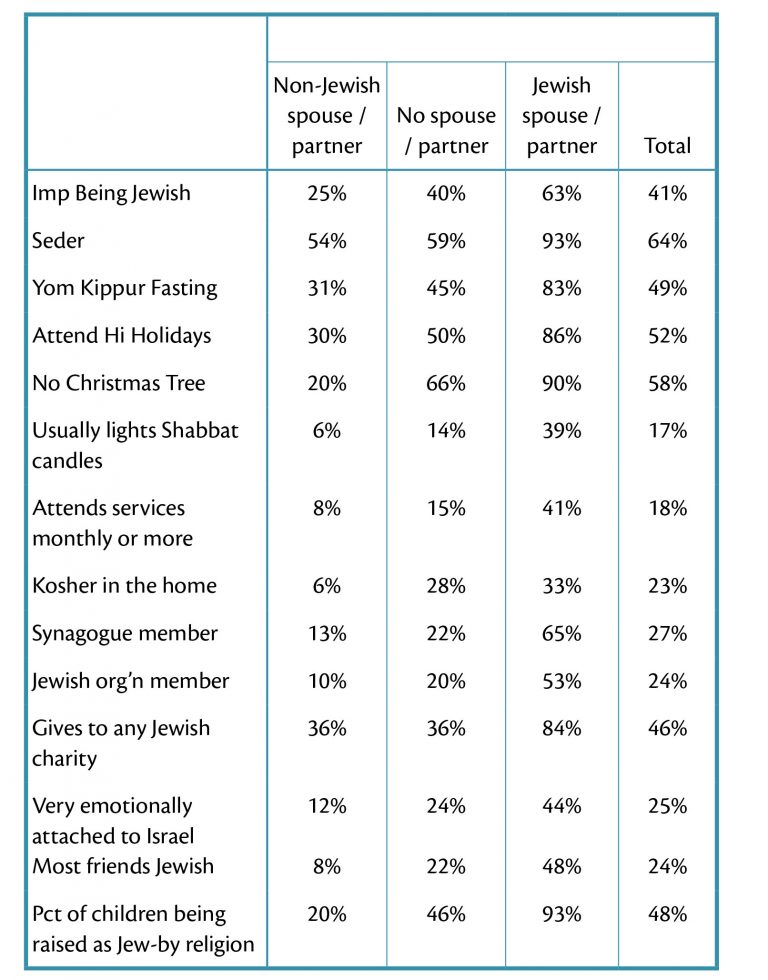 jppi-org-il-Table-8-Jewish identity indicators for non married intermarried and inmarried non Haredi Jews 25-54-2017 The intermarried, non-married, and inmarried report very different levels on every Jewish identity indicator available on the Pew survey. The non-married substantially out-score the intermarried, and the inmarried substantially outscore the non-married. As the tables below show, the gaps in Jewish engagement indicators between the Jews who are inmarried and those who are intermarried are truly enormous. |
||||||||||
Table 9 Jewish identity indicators among those with no children, non-Jewish children and Jewish children, non-Haredi Jews, 25-44
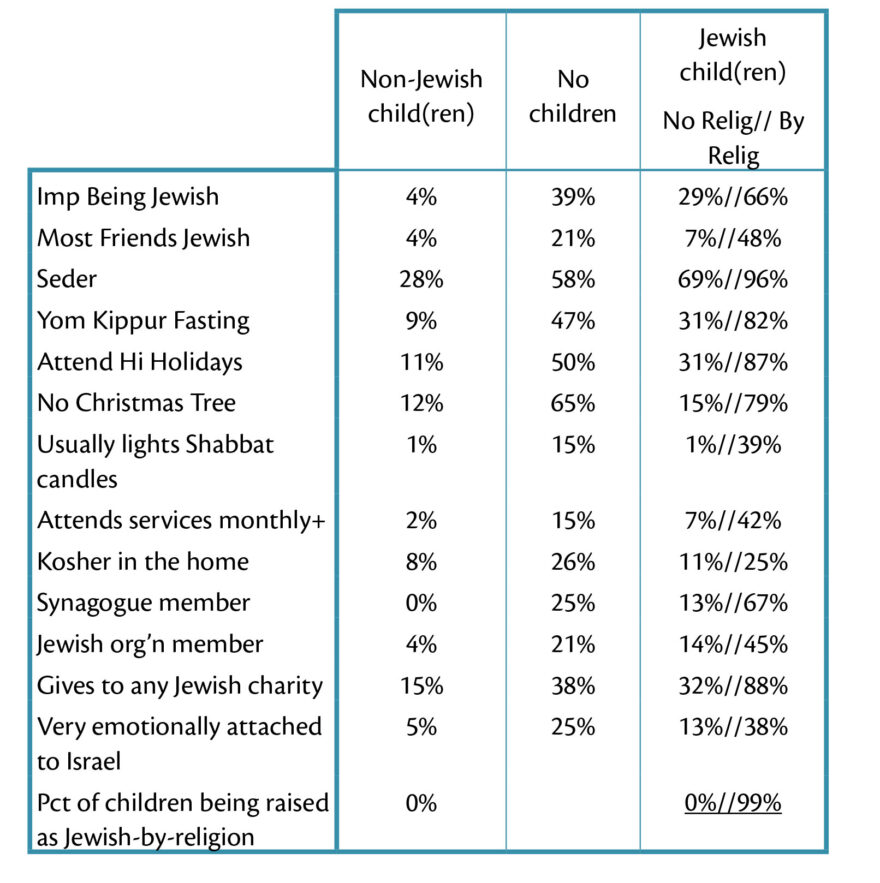 As might now be expected, those with Jewish children at home in turn out-score those with no children, and even more substantially out-score those with non-Jewish children in their households. In every measurable way, the presence of Jewish children – and raising children as Jewish-by-religion – both reflects a prior commitment to Jewish life and, as well, the positive influence of Jewish children upon Jewish engagement. Engaged Jews raise Jewish children, and parents of Jewish children are more engaged in Jewish life. The Jewish People Policy Institute (JPPI) study (http://jppi.org.il/new/en/article/english-raising-jewish-children-research-and-indications-for-intervention/english-introduction/) shows that among all non-Orthodox Jews in the 25-54 age group, just 15% were married to a Jewish spouse and had Jewish children. |
||||||||||
Table 10 Jewish identity by family configuration, all non-Haredi Jewish Americans ages 25-54
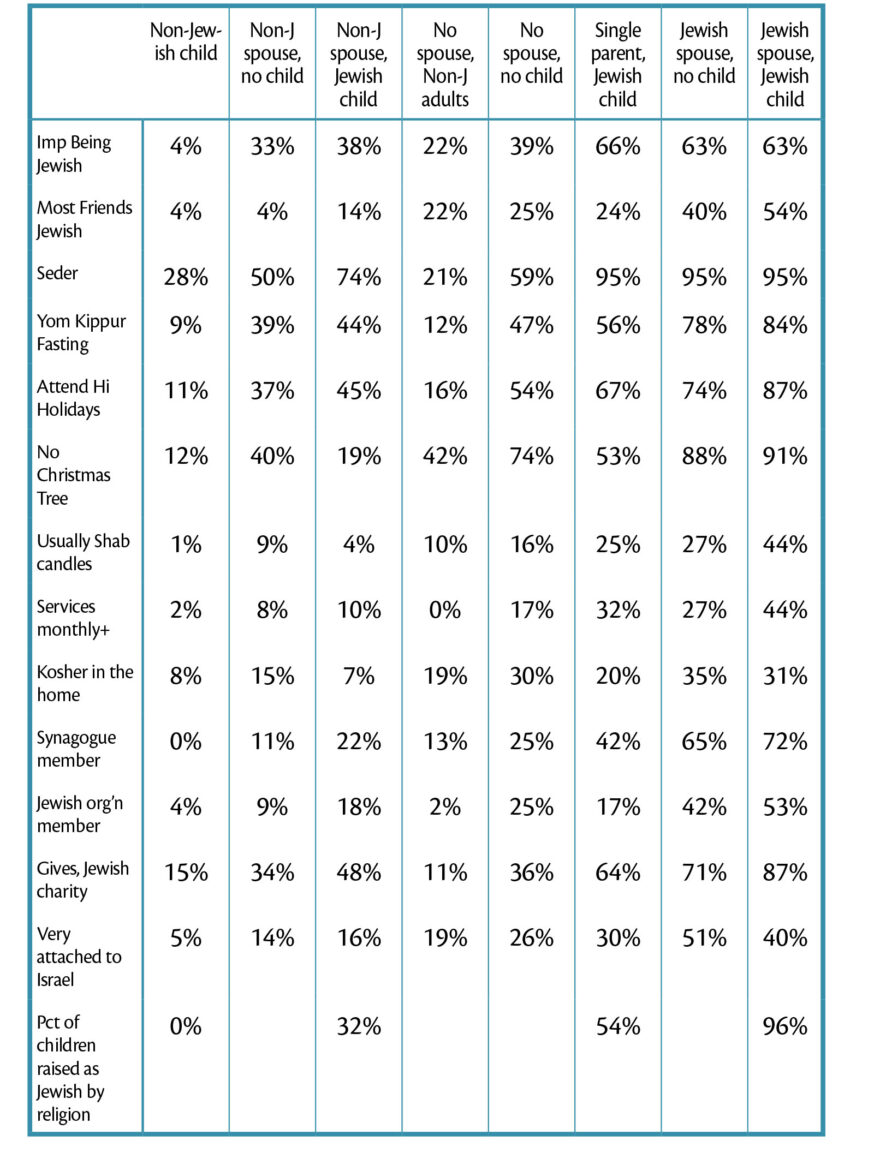 Raising Jewish children has a profound impact on personal Jewish identity. For decades, research showed that American Jews become more involved with Judaism after they marry and especially after they give birth to and begin to raise their children.
Jerusalem Cats Comments: How can you raise Jewish Children without having children early? What do you want a College education (filling your head with fluff which you will never use) or Children? Get Married young and start making and raising Babies.
|
||||||||||
Jerusalem Cats Comments: How can you raise Jewish Children without a good Jewish Education?
Jerusalem Cats Comments: How can you raise Jewish Children without Jewish peers? If you want Jewish teenagers then you need to raise then with Jewish Peers in a Jewish Schools and in a Jewish State with Jewish Holidays and a Jewish Week. Nefesh B’Nefesh: Live the Dream US & CAN 1-866-4-ALIYAH | UK 020-8150-6690 or 0800-085-2105 | Israel 02-659-5800 https://www.nbn.org.il/ info@nbn.org.il Even the most secular teenager in Israel has a better Jewish education then anyone outside of Israel.
To quote the study:
“In terms of predicting adult Jewish connections, statistical studies show that every year past the bar mitzvah year “counts” more than the year before. Receiving formal Jewish education from age 16 to 17 more accurately predicts adult Jewish connectedness than receiving formal Jewish education from age 15 to 16. Quantitative and qualitative research suggest that having mostly Jewish friends in high school is a motivator for continuing formal and informal Jewish education and a predictor for marrying or partnering with a Jew and forging strong Jewish connections. Conversely, when teenagers stopped attending Jewish schools after bar and bat mitzvahs, both they and their parents (in separate interviews) reported that their family Jewish observances and activities such as Shabbat service attendance gradually declined.””This is a growing group. Successive studies have underscored the fact that in 1960, 77 percent of American women and 65 percent of men below the age of 30, had accomplished the five sociological milestones of adulthood–”completing school, leaving home, becoming financially independent, marrying and having a child.” Today, fewer than half of women and one-third of men fit that fully adult profile The proportion of Americans aged 25 to 34 who have never been married exceeds those married. The Jewish identity gains that result from a Jewish education during the teenage years are significantly undermined when young American Jews remain single for a decade or longer after college. These young American Jews between the ages of 22 to 35 require programs tailored to their distinctive form of Jewish attachment.” “When Jewish education succeeds, it is most often a story of the more, the more. Jewish education is part of the ongoing building of Jewish social capital. No one educational strategy provides a permanent Jewish inoculation for all Jews, but all educational strategies work best when they include the reinforcement of a social network.” “But for some Jewish populations who miss these serendipities, the story is more like, the less the less. Some Jews are geographically isolated in childhood, and have few Jewish friendship circles, and do not get sent to Jewish camps that might enrich their Jewishness on many levels [What about a Jewish Day School or Full Time Yeshiva Program of stead of Public School?]. Some are the children of weakly identified Jewish parents; some of these Jewishly “impoverished” families, in terms of Jewish social capital, are intermarried families, especially where the mother does not identify as a Jew. Weak Jewish identification often gets worse with each generation that is remote from Jewish social networks and Jewish education, creating a cycle of poor Jewish social capital.”According The Pew Research Religion and Public life project : Orthodox Jews are more likely than American Jews of any other denomination to have traveled to Israel; 77% have done so, followed by 56% of Conservative Jews, 40% of Reform Jews and 26% of those who have no denominational affiliation. |
||||||||||

Pew:What happens when Jews intermarry?By Gregory A. Smith and Alan Cooperman
American Jews have been debating the impact of intermarriage for decades. Does intermarriage lead to assimilation and weaken the Jewish community? Or is it a way for a religion that traditionally does not seek converts to bring new people into the fold and, thereby, strengthen as well as diversify the Jewish community? The new Pew Research Center survey of U.S. Jews did not start this debate and certainly will not end it. However, the survey’s findings on intermarriage, child rearing and Jewish identity provide some support for both sides.
For example, the survey shows that the offspring of intermarriages – Jewish adults who have only one Jewish parent – are much more likely than the offspring of two Jewish parents to describe themselves, religiously, as atheist, agnostic or nothing in particular. In that sense, intermarriage may be seen as weakening the religious identity of Jews in America.
Yet the survey also suggests that a rising percentage of the children of intermarriages are Jewish in adulthood. Among Americans age 65 and older who say they had one Jewish parent, 25% are Jewish today. By contrast, among adults under 30 with one Jewish parent, 59% are Jewish today. In this sense, intermarriage may be transmitting Jewish identity to a growing number of Americans.
Surveys are snapshots in time. They typically show associations, or linkages, rather than clear causal connections, and they don’t predict the future. We do not know, for example, whether the large cohort of young adult children of intermarriage who are Jewish today will remain Jewish as they age, marry (and in some cases, intermarry), start families and move through the life cycle. With those cautions in mind, here’s a walk through some of our data on intermarriage, including some new analysis that goes beyond the chapter on intermarriage in our original report. (We would like to thank several academic researchers, including Theodore Sasson of Brandeis University, Steven M. Cohen of Hebrew Union College and NYU Wagner, and Bruce Phillips of Hebrew Union College and the University of Southern California, for suggesting fruitful avenues of additional analysis.)
First, intermarriage is practically nonexistent among Orthodox Jews; 98% of the married Orthodox Jews in the survey have a Jewish spouse. But among all other married Jews, only half say they have a Jewish spouse.
In addition, intermarriage rates appear to have risen substantially in recent decades, though they have been relatively stable since the mid-1990s. Looking just at non-Orthodox Jews who have gotten married since 2000, 28% have a Jewish spouse and fully 72% are intermarried.
Also, intermarriage is more common among Jewish respondents who are themselves the children of intermarriage. Among married Jews who report that only one of their parents was Jewish, just 17% are married to a Jewish spouse. By contrast, among married Jews who say both of their parents were Jewish, 63% have a Jewish spouse.
Among Jews, the adult offspring of intermarriages are also much more likely than people with two Jewish parents to describe themselves religiously as atheist, agnostic or just “nothing in particular.” This is the case among all recent generations of U.S. Jews.
For example, among Jewish Baby Boomers who had two Jewish parents, 88% say their religion is Jewish; hence, we categorize them as “Jews by religion.” But among Baby Boomers who had one Jewish parent, 53% describe themselves as atheist, agnostic or having no particular religion, even though they also say they consider themselves Jewish or partially Jewish aside from religion; they are categorized as “Jews of no religion” in the table. Far fewer Jewish Baby Boomers who had two Jewish parents (12%) are Jews of no religion today.
A similar pattern is seen among Jewish Millennials: 51% of Millennials who have one Jewish parent are Jews of no religion, compared with just 15% of Millennials who had two Jewish parents.
Summing this up, it appears that the share of Jews of no religion is similar – and relatively low – among recent generations of Jews with two Jewish parents. It is much higher (and also fairly similar across generations) among self-identified Jews with only one Jewish parent. But it is also important to bear in mind that the percentage of Jewish adults who are the offspring of intermarriages appears to be rising. Just 6% of Jews from the Silent Generation say they had one Jewish parent, compared with 18% of Jewish Baby Boomers, 24% of Generation X and nearly half (48%) of Jewish Millennials. The result is that there are far more Jews of no religion among younger generations of Jews than among previous generations, as shown in the survey report.
When we look at all adults who have just one Jewish parent – including both those who identify as Jewish and those who do not – we see that the Jewish retention rate of people raised in intermarried families appears to be rising. That is, among all adults (both Jewish and non-Jewish) who say they had one Jewish parent and one non-Jewish parent, younger generations are more likely than older generations to be Jewish today.
For example, among U.S. adults ages 65 and older who had one Jewish parent, 25% are Jewish today (including 7% who are Jews by religion and 18% who are Jews of no religion), while 75% are not Jewish (meaning that they currently identify with a religion other than Judaism or that they do not consider themselves Jewish in any way, either by religion or otherwise). Among adults younger than 30 who have one Jewish parent, by contrast, 59% are Jewish today, including 29% who are Jews by religion and 30% who are Jews of no religion. Finally, it has often been assumed that Jewish women are less inclined to intermarry than are Jewish men. As Bruce Phillips, a sociologist at Hebrew Union College in Los Angeles, has written: “In American popular culture, intermarriage has been the [domain] of Jewish males. Starting with ‘Abbie’s Irish Rose’ and ‘The Jazz Singer’ following the turn of the century through ‘Bridget Loves Bernie’ and the ‘Heartbreak Kid’ in the early 1970s to ‘Mad About You’ in the 1990s, the plot is about a Jewish married man in love with a stereotypical [non-Jewish woman].”
But our survey finds that Jewish women are slightly more likely to be intermarried than Jewish men. Among the married Jewish women surveyed, 47% say they have a non-Jewish spouse. Among the married Jewish men, 41% say they have a non-Jewish spouse. |
||||||||||
From aish.com INFOGRAPHIC: Will Your Grandchildren Be Jewish?Are American Jews facing an existential threat? Published: June 10, 2017 http://www.aish.com/jw/s/INFOGRAPHIC-Will-Your-Grandchildren-Be-Jewish.html Will-Your-Grandchildren-Be-Jewish Will Your Grandchildren Be Jews1
|
||||||||||
From aish.com INFOGRAPHIC: Will Your Grandchildren Be Jewish? |
||||||||||
This is the result of not raising Jewish Children in a Jewish environment in a Jewish State with Jewish Peers.New York Times Proves That We Have Lost The Jewish YouthBy Chaim Zalman Hutz April 30, 2019 https://www.israellycool.com/2019/04/30/new-york-times-proves-that-we-have-lost-the-jewish-youth/ The American Jewish community has been rocked by antisemitism in the past week. A shooting at a Chabad synagogue, and not one, but now two antisemitic political cartoons. The anger among the Jewish world has been palpable, and frankly, it’s about time. There has been a blatant rise in antisemitic/anti-Israel attacks (“anti-Israel” is more often than not just code for anti-Jewish) in both America and in Europe and frankly, up until now, the tepid responses from Jewish people and alleged “leadership” have been not only ineffective, but embarrassing. We make just enough waves to get a canned, bogus apology, and, content that we made a real difference, we go back to whatever other preoccupation we were engaged in that made us miss most of the antisemitism in the first place.
Not this time though. Fortunately, this time, the Nazi imagery coupled with a prestigious name like The New York Times lit a fire under activists, culminating in what looked to be a relatively well-manned protest outside their offices yesterday. It would appear that finally, people have decided to take real physical action instead of merely writing angry letters and donating extra money to their local do-nothing Jewish Federation. There was a major problem on display though based on the pictures of the protest. This is a long-term problem, and it will hamper future efforts to fight antisemitism and support Israel at meaningful level. The lack of young people. From the pictures that have been made available to the public thus far, I’m sad to say, Jews everywhere are in trouble. Not only from antisemitism, but from a demographic disaster of our own making. We have lost the American youth. In a city with over one million Jews, there should have been thousands, even tens of thousands of people at this protest. Instead there appeared to be less than five hundred. And the most striking aspect, and the most concerning to me, was that (with all due respect to friends of mine that were there fighting the good fight) I was looking at a sea of mostly gray and white hair.Where were the young people? Where were the college students? Where were the Israel advocates? This protest was at 5:30 PM, plenty of them were out of work, out of class, able to stop by on their way home. Why is it that when its time to protest against Israel for trumped-up charges of genocide and oppression, we see huge numbers of young Jews. When it is time to protest against President Trump, we see huge numbers of young Jews. We see (and hear) loud Jews vocally proclaiming their Jewishness in support of causes that negatively impact their own people. They are Jews who have no sense of history or appreciation for what Israel means, and how deadly antisemitism is. We had the opportunity to teach them these things, and instill in them the desire to turn the passion of youth towards things that help their people and thereby make the world as a whole better but we failed.
We failed to teach them, and as a result of that failure, we lost those Jews. We lost them to apathy. Not general apathy of the type stereo-typically associated with the youth, but with apathy towards their own heritage, turning it into a tool to be trotted out for political capital rather than a source of personal pride and purpose. We chose baseball practice and piano lessons over Hebrew School. We sent our kids to Jewish summer camps that have nothing to do with being Jewish for fear of excluding someone. We allowed our comfort in America, our belief that “it can’t happen here” to make us complacent, and we downloaded that complacency onto our children. We have placed our Americanness over our Jewishness and in doing so, we have raised good Americans, but we have raised profoundly ignorant Jews.
True, there are young Jews that do tremendous work on behalf of Israel, advocating strongly for the Jewish State that should be a guarantee that “Never Again” is more than just a hackneyed phrase, but they are the clear minority at this point. We need to do better, people. If we want our children and grandchildren to care enough about their people to put down their phones, turn off their Playstations and engage with their own heritage, we must do better. It starts with education. When we put all our eggs in the Holocaust education basket, we end up with Jews who say “Woe to be a Jew” rather than “Thank God for making me a Jew”. We end up with a depressed, beaten down group of kids who feel like it would be better to hitch their wagon to any group other than the Jews, particularly when they see the usually soft, hand wringing responses of Jewish leadership when Jews are publicly attacked. Of course we must educate our children about the Holocaust. How else will they come to understand the price of complacency, or to see the signs of trouble on the horizon, such as the New York Times cartoon? The stories of sorrow have to be balanced out with the tales of glory, because no one wants to grow up hearing about how miserable it has been for their people. That won’t inspire any kind of fervor, passion or even interest in most kids, and they will grow up to be the apathetic young adults who are so often missing from the Jewish community. The answer to this education crisis lies with Israel.
Teach your children about Israeli courage, because in the same decade that we were being herded into boxcars at gun point and shipped off to die in Auschwitz, we were freeing our ancestral homeland from the British Empire, fighting off Arab armies at odds of 10-1 and making our little desert into the paradise that it is today as gutsy pioneers. We have thousands of years of rich culture and vibrant history, we are one of the oldest nations on Earth. Unlike the ancient Assyrians, and Babylonians and Romans, we are still here, and what’s more, we’ve come home! Give your children something to be proud of. Make them feel like they are a link in a great, golden chain, rather than a burdened member of a cursed people and I promise you, that if, God forbid, we have to protest again, the average age will be thirty instead of fifty. |
||||||||||
The best solution is to make Aliyah, thereby you children will be raised in a Jewish State with a Jewish environment and marry a Jew. Nefesh B’Nefesh: Live the Dream US & CAN 1-866-4-ALIYAH | UK 020-8150-6690 or 0800-085-2105 | Israel 02-659-5800 https://www.nbn.org.il/ info@nbn.org.il
|
||||||||||
Living The Dream – Nefesh B’Nefesh |
||||||||||
Europe’s Jewish Exodus (Full Length) :: Is the US next? |
||||||||||
Why Civilizations FailWhat is the real challenge of maintaining a free society? In Parshat Eikev, Moshe springs his great surprise. Here are his words:
What Moshe was saying to the new generation was this: You thought that the forty years of wandering in the wilderness were the real challenge, and that once you conquer and settle the land, your problems will be over. The truth is that it is then that the real challenge will begin. It will be precisely when all your physical needs are met – when you have land and sovereignty and rich harvests and safe homes – that your spiritual trial will commence.
The real challenge is not poverty but affluence, not insecurity but security, not slavery but freedom. Moshe, for the first time in history, was hinting at a law of history. Many centuries later it was articulated by the great 14th century Islamic thinker, Ibn Khaldun (1332- 1406), by the Italian political philosopher Giambattista Vico (1668-1744), and most recently by the Harvard historian Niall Ferguson. Moshe was giving an account of the decline and fall of civilisations.
Ibn Khaldun argued similarly, that when a civilisation becomes great, its elites get used to luxury and comfort, and the people as a whole lose what he called their asabiyah, their social solidarity. The people then become prey to a conquering enemy, less civilised than they are but more cohesive and driven.
“People first sense what is necessary, then consider what is useful, next attend to comfort, later delight in pleasures, soon grow dissolute in luxury, and finally go mad squandering their estates.”
Bertrand Russell put it powerfully in the introduction to his History of Western Philosophy. Russell thought that the two great peaks of civilization were reached in ancient Greece and Renaissance Italy. But he was honest enough to see that the very features that made them great contained the seeds of their own demise:
What had happened in the great age of Greece happened again in Renaissance Italy: traditional moral restraints disappeared, because they were seen to be associated with superstition; the liberation from fetters made individuals energetic and creative, producing a rare fluorescence of genius; but the anarchy and treachery which inevitably resulted from the decay of morals made Italians collectively impotent, and they fell, like the Greeks, under the domination of nations less civilised than themselves but not so destitute of social cohesion.
Niall Ferguson, in his book Civilization: the West and the Rest (2011) argued that the West rose to dominance because of what he calls its six “killer applications”: competition, science, democracy, medicine, consumerism, and the Protestant work ethic. Today however it is losing belief in itself and is in danger of being overtaken by others.
All of this was said for the first time by Moshe, and it forms a central argument of the book of D’varim. If you assume – he tells the next generation – that you yourselves won the land and the freedom you enjoy, you will grow complacent and self-satisfied. That is the beginning of the end of any civilization. In an earlier chapter, Moshe uses the graphic word V’NOSHANTEM, “you will grow old” (D’varim 4:25), meaning that you will no longer have the moral and mental energy to make the sacrifices necessary for the defence of freedom.
Inequalities will grow. The rich will become self-indulgent. The poor will feel excluded. There will be social divisions, resentments and injustices. Society will no longer cohere. People will not feel bound to one another by a bond of collective responsibility. Individualism will prevail. Trust will decline. Social capital will wane.
This has happened, sooner or later, to all civilisations, however great. To the Israelites – a small people surrounded by large empires – it would be disastrous. As Moshe makes clear towards the end of the book, in the long account of the curses that would overcome the people if they lost their spiritual bearings, Israel would find itself defeated and devastated.
Next, you sustain freedom by establishing courts, the rule of law and the implementation of justice. By caring for the poor. By ensuring that everyone has the basic requirements of dignity. By including the lonely in the people’s celebrations. By remembering the covenant daily, weekly, annually in ritual, and renewing it at a national assembly every seven years. By making sure there are always prophets to remind the people of their destiny and expose the corruptions of power.
Above all it is achieved by recognising a power greater than ourselves. This is Moshe’s most insistent point. Societies start growing old when they lose faith in the transcendent. They then lose faith in an objective moral order and end by losing faith in themselves.
Only faith in God can lead us to honour the needs of others as well as ourselves. Only faith in God can motivate us to act for the benefit of a future we will not live to see. Only faith in God can stop us from wrongdoing when we believe that no other human will ever find out. Only faith in God can give us the humility that alone has the power to defeat the arrogance of success and the self-belief that leads, as Paul Kennedy argued in The Rise and Fall of the Great Powers (1987), to military overstretch and national defeat.
Towards the end of his book Civilization, Niall Ferguson quotes a member of the Chinese Academy of Social Sciences, part of a team tasked with the challenge of discovering why it was that Europe, having lagged behind China until the 17th century, overtook it, rising to prominence and dominance.
At first, he said, we thought it was your guns. You had better weapons than we did. Then we delved deeper and thought it was your political system. Then we searched deeper still, and concluded that it was your economic system. But for the past 20 years we have realised that it was in fact your religion. It was the (Judeo-Christian) foundation of social and cultural life in Europe that made possible the emergence first of capitalism, then of democratic politics. |
||||||||||
The “Sound of Silence” by Simon & Garfunkel is a classic. But looking at the meaning behind the song, there is so much depth. You have a choice either the Cellphone, Internet and the Computer or Shabbat and family |
||||||||||

After closing, rallying cry for Perutz Etz Jacob Hebrew Academy Jewish Journal For more than 20 years, a Jewish Orthodox day school in West Hollywood strived to provide a quality education to children from immigrant families who couldn’t afford to pay a private school tuition.
But in recent months, Perutz Etz Jacob Hebrew Academy fell behind on rent payments and it was forced to close in July. Now, supporters are fighting to reopen its doors somewhere else.
“I want to cry when I think about what happened,” said Kenneth Lowenstein, 35, an alumnus who is trying to raise money for the school. “Where is the outcry from the philanthropies? Where is the community outrage?”
The academy’s financial troubles started a few months ago, after its landlord raised the rent, Lowenstein said.
The school occupies a corner near the intersection of Beverly Boulevard and Fairfax Avenue, just a short walk from the glitz and glam of The Grove and other luxury boutiques that have popped up in the vicinity. The academy paid $8,000 a month until its landlord nearly tripled the rate to $22,000 earlier this year, according to Lowenstein.
A representative of Hayworth Property Management, the leasing management company, declined to comment for this article, and Rabbi Shlomo Harrosh, who has been the principal of the school since 1994, said he preferred not to discuss the reason for the academy’s closure.
Bernard Suissa, president of the school’s board, said rising costs forced the academy to close but there are no hard feelings. The property’s landlord has been Jacob’s biggest donor for many years, he said.“Sometimes we didn’t pay for many months and they looked the other way,” Suissa said. “They were incredibly patient and gracious with us.”
More than 80 percent of the school’s income came from donations and only 20 percent from tuition, Harrosh said. On top of that, the majority of students whose families struggled with financial problems received a significant discount. The tuition was set at $10,000 a year, but only a fraction of students paid the full amount, according to Harrosh. “If you could pay $600 a month, they would take you,” Lowenstein said. “If you could afford only $200 a month, they would still take you.”
That proved to be an unsustainable business model.
“Rabbi Harrosh has never been a successful fundraiser, but he has always been an excellent teacher,” Lowenstein said. “He has touched so many lives though his education and impacted so many children.”
The Perutz Etz Jacob Hebrew Academy, named after Holocaust survivor Rachela Silber Perutz, was founded in 1993 by Rabbi Rubin Huttler as an emergency school for children who immigrated from Russia and Iran. It enrolled 55 students last year in grades one to eight, some of them with learning disabilities and behavioral problems.
“We took in children who other schools couldn’t handle,” Harrosh said. “We enrolled children who struggled emotionally, academically and financially.”
Since the school’s closure in July, some families placed their children into public schools, while others are still scrambling to find a new school.
One parent is Ross, the father of a 9-year-old son who has a pervasive developmental disorder, or PDD, characterized by delays in the development of social and communication skills. (Ross preferred his full name not be published in order to protect his son’s privacy.)
He reached out to the academy two years ago after other Jewish Orthodox schools refused to accept his son, and was welcomed. Over time, he said, his son fell in love with Perutz Etz Jacobs. Once a day, the boy spent at least an hour studying one on one with Harrosh or other teachers. During holidays, the boy begged Ross to take him to school.
In August, Ross found out that the academy was forced to close, news that his son didn’t take well. Now, Ross is scrambling to find a new school for his son.
“It was very traumatic for him,” Ross said. “He has nowhere to go now, and he is very upset about it.”
Unlike some other schools, Perutz Etz Jacob, situated in an unimposing, one-story structure, could never brag about a state-of-the-art building, spacious grounds or classrooms equipped with iPads, said Lowenstein, who spent two years there before graduating in 1995.
But its teachers provided plenty of love and support for their students, according Harrosh.
“Our students saw Judaism in action,” the rabbi said. “When you care about every child, you see Judaism in action.”
Lowenstein, who now runs a security firm, said he was a troubled child with learning disabilities when he was accepted to the school, which quickly became his second home.
“I had combative relationships with my parents and sometimes I asked my teachers to stay a little longer,” he said. “The school became my home away from home.”
Many other children had similar experiences, said Ross, who reached out to the academy after several people told him how Harrosh changed their lives. “More than one person told me something like, ‘When I was a kid, Rabbi Harrosh saved my life,’ ” he said.
On a recent weekday afternoon, the yellow one-story stucco building located at the intersection of Beverly and Hayworth Avenue showed no sign of the day school. Construction materials were seen in empty rooms through a dusty window.
Just recently, Lowenstein posted a message on Facebook about the closure of the academy, calling on the school’s alumni, including lawyers, doctors and real estate developers, to give back to the school that “has done so much for so many families.” His hope is that with the community’s support, the school will find a new building so that it can relocate.
“I want to reach as many people as possible, make phone calls, and track alumni via social media,” he said. “I want to do as much as possible to help the school.”
In the meantime, Harrosh is planning to meet and work with some students one on one. He said it breaks his heart knowing that some children still have not started the school year.
“Those children need more love and attention,” he said. “I don’t blame other schools, but they are too big to give attention that those children need.” |


